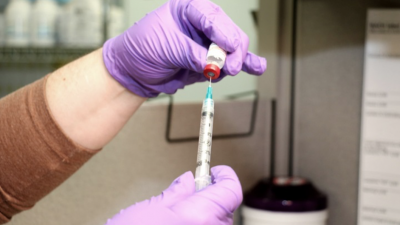As news of the nCoV-2019, a new type of coronavirus, continues to sweep the globe, a vaccine is in the works across the river in Cambridge. Local biotechnology company Moderna Inc. launched the venture on Jan. 23.
The company is collaborating with the Coalition for Epidemic Preparedness Innovations, headquartered in Norway, and will also be working with U.S. government agency the National Institutes of Health.

A Moderna spokesperson wrote in an email that the vaccine would use messenger RNA — a molecule in the cell that transports DNA instructions in the protein-making process — to pre-expose the immune system to a small amount of protein from an antigen, a foreign molecule that causes causes the immune system to react.
“Our approach is to use mRNA medicines to instruct a patient’s own cells to produce proteins that could prevent, treat, or cure disease,” Moderna wrote. “The potential advantages of an mRNA approach to [disease-preventing] vaccines include the ability to stimulate a more potent immune response [and] combining multiple mRNAs into a single vaccine.”
Compared to traditional vaccine development methods, according to Moderna, centering on mRNA can foster quicker discovery of solutions to emerging pandemic threats, as well as increased agility in the manufacturing process.
CEPI will fund Moderna’s study material and preclinical manufacturing costs in preparation for the Phase 1 trial, during which small groups of individuals will receive the vaccine. The NIH will then conduct this trial again once it is ready to be implemented.
Moderna wrote additional studies will likely be required before the vaccine can be marketed or put to use anywhere in the world.
“Our collaboration with CEPI and NIH should allow us to determine if our vaccine may be effective against [the coronavirus],” Moderna wrote, “and if so we will work to determine how to further develop and manufacture the vaccine for use in the countries where it is needed.”
David Hooper, chief of the Infection Control Unit at Massachusetts General Hospital, said because every viral outbreak is unique, experts cannot reasonably predict when a vaccine might become available for public use.
“People are still working on an HIV vaccine, for example,” Hooper said. “It depends on the virus and its properties and the way it causes infections and what sort of immune response is most effective for preventing it.”
This new type of coronavirus is similar to the SARS and MERS coronaviruses, both of which have also been the culprit of viral outbreaks since 2000.
Hooper said respiratory droplets — from coughs and sneezes, for example — are the most likely mode of transfer between people. How transmissible the virus actually is, however, remains unclear.
“We don’t yet fully know whether people can transmit the virus before they have symptoms or whether it’s only after they have symptoms,” Hooper said. “For both SARS and MERS, generally these viruses are not transmitted by infected persons until those persons have symptoms.”
While the outbreak has reached epidemic levels in China, Hooper said, cases within the U.S. are still marginal and the risk of coming into contact with the virus remains low.
“What’s much more concerning, of course, is the regular seasonal flu that we’re in the midst of [at] the peak of the season,” Hooper said. “So you’re more likely to get influenza than the coronavirus.”
A spokesperson for the Massachusetts Department of Public Health wrote in an email it is working with the U.S. Centers for Disease Control to keep tabs on the virus.
“The risk to Massachusetts residents from this novel coronavirus is currently low,” the DPH wrote. “However, this is the season for respiratory viruses including the flu and many of the same recommended precautions apply to coronaviruses.”
Back Bay resident Moni Garza, 46, said she is glad to know researchers are working on a vaccine.
“What’s going on right now, it’s really scary,” Garza said. “I mean, of course I heard about just everyone being afraid, and just feeling paralyzed about that.”
Alex Miller, 21, of Lynn said he is concerned about whether countries are doing enough to contain the spread of the illness.
“We shouldn’t be letting people in from countries where the infection is,” Lynn said. “If it gets into one airport, it can spread to more and more.”
Back Bay resident James Burke, 48, said he is satisfied with the additional screening he has noticed at international airports.
“I’m not really too worried about it right now,” Burke said. “Because there was a lot of hype around Ebola too.”
























































































































